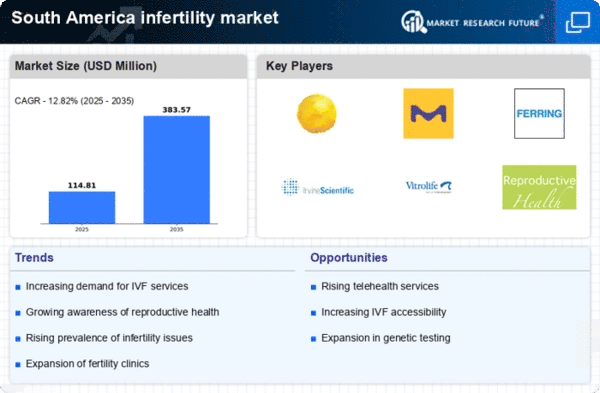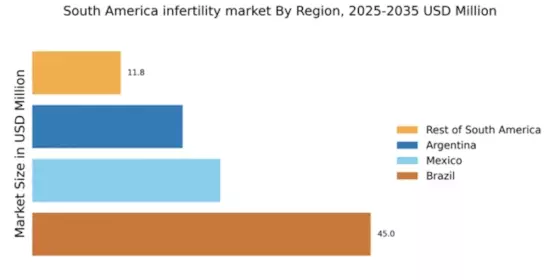Increasing Infertility Rates
The rising infertility rates in South America are a crucial driver for the infertility market. Recent data indicates that approximately 15% of couples in the region experience infertility issues, which is a significant concern. Factors contributing to this trend include lifestyle changes, delayed childbearing, and environmental influences. As more couples seek solutions, the demand for fertility treatments and services is expected to grow. This increasing prevalence of infertility is likely to propel the market forward, as healthcare providers and fertility clinics expand their offerings to meet the needs of affected individuals. The infertility market in South America is thus poised for growth, driven by the urgent need for effective reproductive solutions.
Expansion of Fertility Clinics
The expansion of fertility clinics across South America is a significant driver of the infertility market. With an increasing number of specialized clinics opening in urban areas, access to fertility treatments is improving. This growth is supported by investments from both private and public sectors, aiming to enhance reproductive healthcare services. As of 2025, the number of fertility clinics in South America has increased by approximately 20%, indicating a robust market response to rising demand. The availability of advanced reproductive technologies and personalized treatment plans is likely to attract more patients, further stimulating the market. The proliferation of these clinics is essential for addressing the needs of couples facing infertility challenges.
Technological Innovations in Treatment
Technological innovations in fertility treatments are driving advancements in the infertility market in South America. The introduction of cutting-edge techniques, such as in vitro fertilization (IVF) and preimplantation genetic testing, is enhancing success rates for couples facing infertility. These innovations are not only improving treatment outcomes but also making procedures more accessible and affordable. As technology continues to evolve, the market is likely to witness a surge in demand for these advanced reproductive solutions. The integration of telemedicine and digital health tools is also transforming patient experiences, allowing for more personalized care. This technological progress is essential for meeting the growing needs of individuals seeking fertility assistance.
Cultural Shifts Towards Family Planning
Cultural shifts in South America are influencing attitudes towards family planning and reproductive health. As societal norms evolve, there is a growing acceptance of assisted reproductive technologies and fertility treatments. This change is reflected in the increasing willingness of couples to seek medical assistance for infertility issues. The infertility market in South America is benefiting from this cultural transformation, as more individuals recognize the importance of reproductive health. Additionally, educational initiatives aimed at raising awareness about fertility options are further driving this trend. The market is likely to see a rise in demand for services as couples prioritize family planning and explore various reproductive technologies.
Rising Awareness of Reproductive Health
Rising awareness of reproductive health issues is significantly impacting the infertility market in South America. Educational campaigns and healthcare initiatives are informing the public about infertility causes and treatment options. This increased awareness is leading to more individuals seeking help for their reproductive health concerns. As a result, the market is experiencing a surge in demand for fertility services and consultations. Reports suggest that around 30% of individuals in South America are now more informed about infertility treatments compared to previous years. This trend is likely to continue, as ongoing education and outreach efforts further empower couples to take charge of their reproductive health.

















